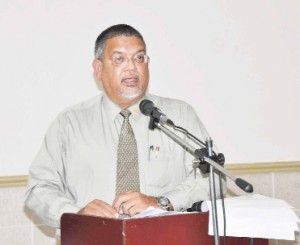A call by President of the manufacturers association, Ramesh Dookhoo for measures to be put in place to remove the difficulties faced by legitimate exporters to the United States in the wake of the use of agricultural commodities to smuggle drugs has been strongly backed by the heads of two other leading private sector bodies.

At the April 30 private sector luncheon hosted by the Guyana Manufacturing and Services Association (GMSA), Dookhoo issued a call for the creation of “a system of Recognised Economic Exporter” to enable the authorities “to differentiate between genuine exporters and one-time, pumpkin, squash and fish exporters” whose interest is in “other items.”
And the call by the GMSA President has secured the backing of both Private Sector Commission (PSC) Chairman Captain Gerry Gouveia and Georgetown Chamber of Commerce and Industry (GCCI) President Chandradat Chintamani, both of whom told Stabroek Business that they believed that the use of conventional exports as vehicles for the smuggling of illegal drugs presented a serious danger to the country’s export sector.
Chintamani told Stabroek Business that while the illegal practice had already done the export sector “a great deal of damage” the circumstances now presented the local private sector with “a big challenge” if it is to retrieve the situation. He said that what was required was “a collective effort” involving local exporters, the United States Embassy, the local Customs authorities and the authorities in the United States to ensure that the strictest possible surveillance was maintained while protecting legitimate exporters into the United States against possible sanctions.
Gouveia told Stabroek Business that while it was necessary to “appreciate the position taken by the United States authorities,” local private sector bodies needed to work with government and the US authorities to ensure that exports to the United States were not compromised particularly at this time. “How to satisfy the authorities in the USA regarding the intentions of our exporters in circumstances where there have been so many bad experiences is a real challenge since one expects that the authorities in the receiving country will now be on high alert for possible drug smuggling using agricultural produce as a conduit,” Gouveia said.
And according to Gouveia consideration might be given to a system of “accreditation” for exporters. “Of course I am not implying that accredited exporters would be exempt from inspection. What such a system would do, however, is seek to establish the bona fides of the legitimate exporters,” he added. He said that he believed that the various local private sector bodies could play a role, along with the Government of Guyana and the US Embassy here in “working out the conditions” under which accreditation should be granted.
Chintamani told Stabroek Business that the GCCI was concerned that any new rules and procedures do not exclude any category of exporter seeking to target markets in the United States. He said that while the illegalities attach themselves primarily to one-time exporters, it was not desirable that this result in a situation in which first-time exporters are labelled since it was also desirable that new exporters be encouraged. “We want to do this correctly rather than to take broad steps that would create further disadvantage for any category of exporter,” Chintamani said.





